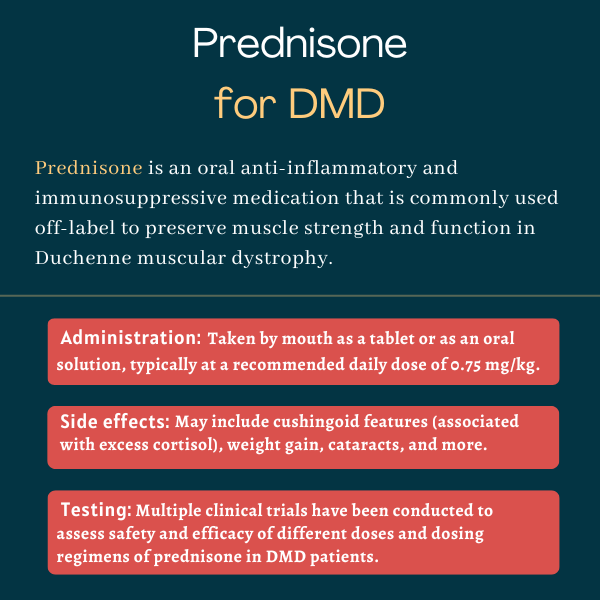Prednisone for Duchenne muscular dystrophy
Last updated June 3, 2024, by José Lopes, PhD

What is prednisone for Duchenne muscular dystrophy?
Prednisone is an oral corticosteroid that can be used to ease inflammation and preserve muscle strength and function in people with Duchenne muscular dystrophy (DMD). The medication is not formally approved as a treatment for DMD, but is routinely used off-label for this indication.
More specifically, the American Academy of Neurology guidelines published in 2016 recommended prednisone should be made available to DMD patients to improve muscle strength and lung function. The guidelines also noted it could be used to reduce the need for scoliosis surgery and delay the onset of cardiomyopathy, or heart muscle disease.
It remains to be determined whether the approval of new steroids with more favorable safety profiles — e.g. Agamree (vamorolone) — will prompt changes in these recommendations.
Brand names and formulations
Prednisone was approved by the U.S. Food and Drug Administration in the 1950s and is used as an anti-inflammatory and immunosuppressive agent in a wide range of conditions.
In the U.S., it’s available under several brand names and generic formulations. Oral tablets include the delayed-release formulation Rayos, whereas oral solutions include Prednisone Intensol.
Therapy snapshot
| Treatment name: | Prednisone |
| Administration: | Oral tablets and oral solution |
| Clinical testing: | Studies have tested the effects of prednisone at preventing muscle strength decline in DMD |
How does prednisone work?
Prednisone is a steroid medication that mimics the action of cortisol, a naturally occurring hormone, which can modulate inflammatory signals and other cellular pathways by binding to glucocorticoid receptors.
A biologically inactive molecule, or prodrug, prednisone is converted into active prednisolone in the liver. The active molecule can then pass through the cell membrane and bind to glucocorticoid receptors inside the cell, forming a complex that can regulate gene activity inside the nucleus to stifle the production of inflammatory mediators.
The precise mechanisms through which corticosteroids work in the muscle are not fully known, but they have been reported to inhibit the breakdown of proteins in muscle, stimulate muscle repair, stabilize muscle fiber membranes, and have anti-inflammatory and immunosuppressive effects, all of which are believed to contribute to increased muscle strength.
How is prednisone administered?
Prednisone is an oral medication that’s available in tablets or as a liquid formulation.
The recommended dosing regimen among people with DMD is 0.75 mg per kg of body weight per day. If significant side effects develop, patients may have their dose lowered to 0.3 mg/kg per day, which may be less effective but will have fewer side effects.
According to guidelines that address corticosteroid treatment for DMD, a higher daily dose — 1.5 mg/kg — may be equally effective but may lead to more adverse events. A 10 mg/kg dose given over the weekend also seems to have a similar effectiveness as the daily 0.75 mg/kg regimen, but its long-term effects have not been established.
Prednisone in clinical trials
Although prednisone has not been formally approved to treat DMD in the U.S., multiple clinical studies, including Phase 3 trials, have been conducted in this patient population.
Phase 3 trials
A two-part Phase 3 trial conducted in the 1990s included 196 boys with DMD, ages 5-15, who experienced the first signs of muscle weakness before age 5. They were randomly assigned to receive one of two doses — 0.9 mg/kg and 1.2 mg/kg — of Emflaza (deflazacort), an oral corticosteroid approved for DMD, prednisone capsules at a dose of 0.75 mg/kg, or a placebo.
All were given daily for 12 weeks, or about three months, after which patients given a placebo were reassigned to one of the active treatment groups for an additional 40 weeks, for a total trial duration of one year for all the groups.
The trial’s main goal was to determine changes in muscle strength over the first 12 weeks, as assessed with the Medical Research Council (MRC) scale. Secondary measures included changes in muscle strength in the trial’s second part, and lung function.
All the therapies significantly improved muscle strength over the first 12 weeks, which contrasted with a decline observed in the placebo group. Functional tests, including the time it took to stand from a supine position, climb four stairs, and walk or run 30 feet, also showed significant improvements with all active treatments after three months and one year.
Regarding safety, the prednisone group showed more weight gain-related side effects, including increased appetite, excess abdominal fat, and obesity. Psychiatric side effects such as abnormal behavior, aggression, and irritability were also more common with prednisone.
A double-blind Phase 3 study (NCT01603407) launched in 2013 also included 196 boys with DMD, ages 4-7, who had never been treated with corticosteroids.
The participants were randomly assigned to one of three treatment regimens for at least three years: daily prednisone tablets at 0.75 mg/kg, daily at the approved dose of 0.90 mg/kg, or intermittent prednisone, meaning 10 days on 0.75 mg/kg and 10 days off.
The trial’s main goal was a composite measure that included velocity to rise from the floor, a lung function assessment called forced vital capacity, and participant or parent global satisfaction with treatment.
Both daily prednisone and daily Emflaza were significantly more effective than intermittent prednisone in that composite outcome measure, although significant differences were only observed in rise from the floor velocity. The two daily regimens didn’t show significant differences.
The most frequent adverse events observed with daily prednisone treatment were abnormal behavior, upper respiratory tract infection, and vomiting, though the rate of these side effects was similar across the three groups.
Another double-blind Phase 3 trial (NCT00110669) compared the recommended 0.75 mg/kg daily dose of prednisone against a higher, 10 mg/kg dose given over a weekend (divided into two doses taken on Saturday and Sunday) for one year.
A total of 64 boys between the ages of 4 and 10 were enrolled in the study, which mainly sought to assess muscle strength in the arms and legs. Secondary measures included muscle strength in individual muscle groups, lung function, and timed function tests, such as the time to run or walk 10 meters (32 feet), to climb four stairs, and to stand from a supine position. Changes in body mass index (BMI), which are common with prolonged high doses of corticosteroids, were the main safety measure.
The weekend-only prednisone dosing was as safe and effective as the daily regimen in maintaining muscle strength. The higher dose, however, tended to result in higher gains in pulmonary function and in smaller increases in BMI than daily treatment.
Other studies
A six-month clinical trial of 103 DMD boys, ages 5-15, also showed a 1.5 mg/kg daily dose resulted in similar improvements in muscle strength and function as the recommended 0.75 mg/kg daily dose. Improvements were observed with both doses as early as one month after treatment initiation and peaked after three months.
Compared with a placebo, the participants in the higher dose group saw improvements on the time needed to rise from a supine to a standing position, walk 9 meters, and climb four stairs after six months. These patients also lifted heavier weights and showed better lung function.
Biomarker assessments also suggested increased muscle mass. The most common adverse events were weight gain, cushingoid appearance, and excessive hair growth.
Long-term data have also demonstrated that treatment with corticosteroids for longer periods provides greater benefits among DMD patients.
For example, data from the Duchenne Natural History Study, which included 440 patients, ages 2-28, who were followed for up to 10 years, showed that treatment with steroids such as prednisone, prednisolone, or Emflaza for one year or more delayed disease progression and the loss of certain mobility milestones compared to no steroid treatment or treatment of less than one month. Benefits were also seen in lung function.

Common side effects of prednisone
Common side effects of prednisone in DMD include:
- cushingoid features
- weight gain
- hirsutism (excessive hair)
- delayed growth
- mood changes
- low bone density
- cataracts, or clouding of the eye lens
- high blood pressure.
Prednisone may also lead to other side effects and safety warnings that have been reported in approved indications.
Hormonal changes
Because prednisone mimics the activity of the naturally occurring hormone cortisol, it can cause several hormone-related alterations, including a reduction in the amount of cortisol produced by the adrenal glands. Thus, patients are strongly advised not to abruptly stop taking corticosteroids, which may lead to a medical emergency called adrenal crisis wherein the body cannot produce enough cortisol to keep up its daily needs.
Infections
Due to its immunosuppressive effects, prednisone may increase the risk of new infections and worsen or reactivate existing ones. The treatment may also mask signs of infections.
Gastrointestinal perforations
People with certain digestive tract disorders, such as ulcers or some kinds of intestinal infections, may have an increased risk of gastrointestinal perforation, or a tear in the digestive tract, with prednisone. Signs of gastrointestinal perforation, such as irritation and inflammation of the gut, may be masked in patients on prednisone, however.
Eye problems
Chronic use of prednisone may lead to eye issues such as cataracts, infections, and glaucoma, which can damage the nerves that connect the eye to the brain. Patients treated for more than six weeks should have their pressure within the eyeballs monitored.
Vaccination
Vaccines containing a live or attenuated (weakened) virus are contraindicated in patients on immunosuppressive doses of corticosteroids. Killed or inactivated vaccines may be administered to those patients, but the response to such vaccines cannot be predicted.
Use in pregnancy and breastfeeding
Prednisone can cause damage to a developing fetus, especially when used in the first trimester of pregnancy. Women who use prednisone during pregnancy should be informed about the potential risks to the fetus, which may include growth restriction, mouth clefts, and decreased birth weight.
The active form of prednisone also is secreted in small amounts in human breast milk and may interfere with the growth of a newborn, especially when given at high or prolonged doses. Thus, the medication should only be used during pregnancy or breastfeeding if the benefit of the treatment outweighs the potential risks.
Muscular Dystrophy News Today is strictly a news and information website about the disease. It does not provide medical advice, diagnosis, or treatment. This content is not intended to be a substitute for professional medical advice, diagnosis, or treatment. Always seek the advice of your physician or other qualified health provider with any questions you may have regarding a medical condition. Never disregard professional medical advice or delay in seeking it because of something you have read on this website.
Recent Posts
Related articles




